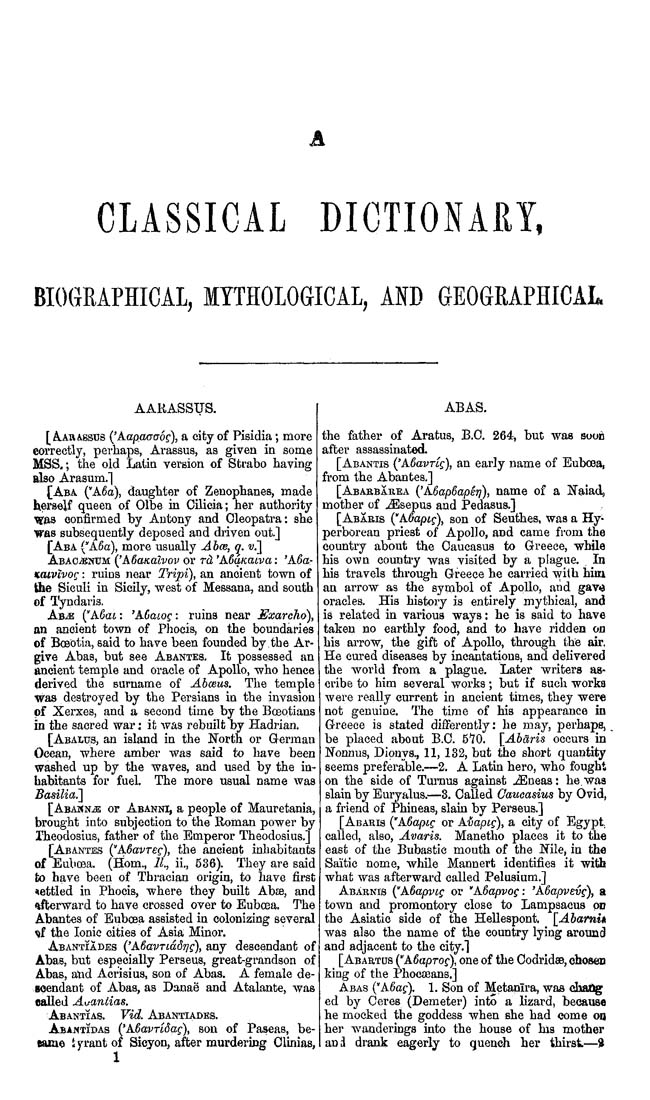CLASSICAL DICTIONARY,
BIOGRAPHICAL, MYTHOLOGICAL, AND GEOGRAPHICAL.
AARASSLJS.
[ Aakabsus ('Aapaaaog), a city of Pisidia; more
correctly, perhaps, Arassus, as given in some
MSS,; the old Latin version of Strabo having
also Arasum.]
[Aba (*A6a), daughter of Zenophanes, made
herself queen of Olbe in Cilieia; her authority
Mas confirmed by Antony and Cleopatra: she
was subsequently deposed and driven out]
[Aba {"A6aj, more usually Abm, q. «.]
Abacsnum ('Adanalvov or r<2 'ABqucuva: 'A6a-
Kcuvlvor: ruins near Tripi), an ancient town of
the Siculi in Sicily, west of Messana, and south
of Tyndaris.
Ab^e ("Aliai.: 'ACaiog: ruins near Exarcho),
an ancient town of Phocis, on the boundaries
of Boeotia, said to have been founded by the Ar-
give Abas, but see Abantes. It possessed an
ancient temple and oracle of Apollo, who hence
derived the surname of Abceus. The temple
was destroyed by the Persians in the invasion
of Xerxes, and a second time by the Boeotians
in the sacred war: it was rebuilt by Hadrian.
[Abalus, an island in the Worth or German
Ocean, where amber was said to have been
washed up by the waves, and used by the in¬
habitants for fuel. The more usual name was
Basilia.]
[Ababn2b or Abanni, a people of Mauretania,
brought into subjection to the Roman power by
Theodosius, father of the Emperor Theodosius.]
[Abantes ("ABavrec), the ancient inhabitants
of Euboea. (Horn., 11,, ii., 636). They are said
to have been of Thraeian origin, to have first
settled in Phocis, where they built Abse, and
afterward to have crossed over to Eubosa. The
Abantes of Euboea assisted in colonizing several
tf the Ionic cities of Asia Minor.
Abantiades ('ABavnddr/g), any descendant of
Abas, but especially Perseus, great-grandson of
Abas, and Acrisius, son of Abas. A female de¬
scendant of Abas, as Danae and Atalante, was
sailed Auantias.
Abantias. Vid. Abantiades.
Abamtidas ('ABavriSag), son of Paseas, be-
eame i yrant of Sicyon, after murdering Clinias,
1
ABAS.
the father of Aratus, B.C. 264, but was soon
after assassinated.
[Abantis ('ABavTie), an early name of Euboea,
from the Abantes.]
[Ababbaeea ('A6ap6ape7i), name of a Naiad,
mother of iEsepus and Pedasus.]
[Abaris ("A6api£), son of Seuthes, was a Hy¬
perborean priest of Apollo, and came from the
country about the Caucasus to Greece, while
his own country was visited by a plague. . In
his travels through Greece he carried with him
an arrow as the symbol of Apollo, and gave
oracles. His history is entirely mythical, and
is related in various ways: he is said to have
taken no earthly food, and to have ridden on
his arrow, the gift of Apollo, through the air.
He cured diseases by incantations, and delivered
the world from a plague. Later writers as¬
cribe to him several works; but if such works
were really current in ancient times, they were
not genuine. The time of his appearance in
Greece is stated differently: he may, perhaps,
be placed about B.C. 570. [Abaris occurs in
Nonnus, Dionys, 11, 132, but the short quantity
seems preferable.—2. A Latin hero, who fought
on the side of Tumus against iEneas: he.was
slain by Euryalus.—3. Called Oaucasius by Ovid,
a friend of Phineas, slain by Perseus.]
[Abaeis ("A6apic or Avapic), a city of Egypt.
called, also, Avaris. Manetho places it to the
east of the Bubastie mouth of the Wile, in the
Saitic nome, while Mannert identifies it with
what was afterward called Pelusium.]
Abaknis ("ABapvie or "ABapvos: 'ABapvevg), a
town and promontory close to Lampsacus on
the Asiatic side of the Hellespont. [Abarnh
was also the name of the country lying around
and adjacent to the city.]
[Abarths ("ABaproc), one of the Oodridae, chosen
king of the Phocffians.]
Abas ("Aeac). 1. Son of Metanira, was chaOg
ed by Ceres (Demeter) into a lizard, because
he mocked the goddess when she had come on
her wanderings into the house of his mother
aDd drank eagerly to quench her thirst—8
|








